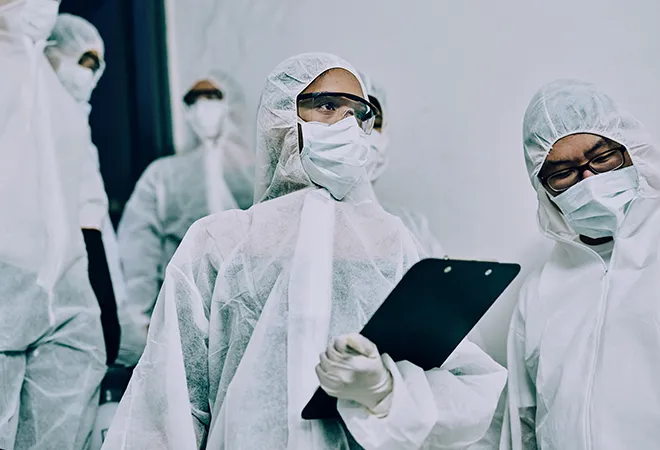
Before COVID19 landed on to the shores of South Africa, the state of the nation was not the peachiest. According to the World Bank – South Africa is known for its inequality around the world with a Gini coefficient of 63. The inequality study for South Africa was last undertaken in 2014, when South Africa had statistically recorded an unemployment rate of 25%. As of Jan 2020, 29% of South Africans were recorded to be unemployed and as per the forecasts done by Trading Economics – this number will increase to over 30% by May 2020. This warrants a hypothesis that the wealth inequality has gotten worse and is expected to get worse as more people lose their main income streams.
Most adults in the country make money from informal jobs such as being maids, handymen or selling fruits and vegetables on the sidewalk in town. This means that they live hand to mouth and have very little to no disposable income for any form of health insurance. Then there are some who rely completely on the social grants given by the government for living expenses. As a result, a lot of South Africans rely on the free healthcare system which is already swamped. Most people do not have medical aid and rely on home remedies to fight off a cold. If it gets bad, they then have to go to crowded clinics where they will spend an entire day to walk out with a packet of paracetamol and cough syrup.
UNAIDS states that over 20% of South African adults (aged 15 – 49) live with HIV.
Additionally, Tuberculosis (TB), a respiratory disease, is the leading cause of death in South Africa. TB kills 330 people daily and 80% of those who die from TB are also HIV positive. It is because of the poor state of the country’s health infrastructure that the government decided to lockdown the country as we approached 1000 confirmed cases. South Africa’s high prevalence of underlying conditions that make people more vulnerable to COVID19 is what led to South Africans rally behind the president's decision to shut down the country, just three weeks after the first confirmed case.
The lockdown came with a freeze on non-essential movement by citizens. It started with a restriction on gatherings to no more than 100 people and then the closure of schools. This originated concern from a lot of people because the South African education system is not known to be the best. Learners are crammed into small classrooms with very limited resources. Learning is hard even with a teacher in a classroom. Most learners come from families where the parents barely made it past 10th grade and so in this regard home-schooling is not an option. What about online learning resources? Well, even if learners have access to a smartphone, there is a big barrier to entry because of the high price of mobile data.
The high costs of data in South Africa was a hot topic long before the COVID19 outbreak. The lockdown caused many small businesses to shut down. Some of these businesses have cut the salaries of their employees and in some cases, laid people off already. Even big corporations like the EOH Group have taken stringent measures to reserve cash by cutting down on employee benefits and salaries.
A lot of families are distraught during this lockdown period. They do not know where their next meal will come from. Those who live in crowded townships are still wondering how they would be able to “isolate” themselves. There is no way to isolate in a small shack with a family of eight. Hygiene conditions are already questionable in places like Alexandra Township, right down the road from Sandton, the richest square mile in Africa. This outbreak has highlighted the underlying class struggles that exist in South Africa. The rich and middle-class income group people are calling out those in Townships for not staying at home. They say “those people don’t care for the law” but those people are just trying to survive. They are simply trying to secure the next meal for their families. For a lot of township dwellers, it is either they die from COVID19, or they die from hunger.
On the 9 April, President Ramaphosa announced that the government is working on a plan to financially aid small businesses that have shut down and families that are not able to make a living during this time. The good news is that the shutdown has bought the government time to do mass tests and slow down the infection rates. Although this shutdown comes at an economic and social cost the government has chosen to put the health of its people first. For many South Africans this firm and decisive leadership is reassuring.
A solidarity fund has been established to mobilize resources to help the country fight the pandemic. The fund has raised over R2.2 billion from private companies and individuals. The president, ministers and their deputies have pledged to take a one third salary cut for the next three months to help raise funds for the solidarity fund. This has been met with positive response from citizens and opposition political parties, who, along with ordinary citizens have also pledged to donate a third of their salaries to the solidarity fund.
The goal of the solidarity fund is to relieve the strain on government and distribute resources from individuals to the public. R1 Billion from the fund has been dedicated to buy equipment for hospitals to prepare for the pandemic; funds have also been allocated to help disadvantaged households and businesses who have not been able to generate an income during the shutdown. In the meantime, many South Africans continue to count the days and toss the coin.
The views expressed above belong to the author(s). ORF research and analyses now available on Telegram! Click here to access our curated content — blogs, longforms and interviews.




 PREV
PREV



